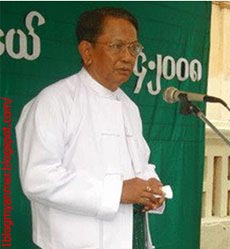Junta generals and former members of the Union Solidarity and Development Association (USDA), now standing as civilian politicians for the Union Solidarity and Development Party ...
Chiang Mai (Mizzima) – Junta generals and former members of the Union Solidarity and Development Association (USDA), now standing as civilian politicians for the Union Solidarity and Development Party (USDP), are accused of involvement in the massacre at Depayin and the bloody crackdown on the “Saffron Revolution”.
 The USDA is notorious for its bloody attacks on opposition and democratic forces, including pro-democracy leader Aung San Suu Kyi and her entourage in Depayin, northern Burma in 2003. At least 5,000 USDA members gathered in a co-ordinated attack, and at least 70 people associated with the National League for Democracy (NLD) were killed. USDA members also participated in the violent crackdown on the monk-led “Saffron Revolution” in 2007.
The USDA is notorious for its bloody attacks on opposition and democratic forces, including pro-democracy leader Aung San Suu Kyi and her entourage in Depayin, northern Burma in 2003. At least 5,000 USDA members gathered in a co-ordinated attack, and at least 70 people associated with the National League for Democracy (NLD) were killed. USDA members also participated in the violent crackdown on the monk-led “Saffron Revolution” in 2007.
Former generals, who disrobed from their soldierly attire in June to don civilian clothing to run in the “civilian” junta-backed USDP in June, include former lieutenant colonel Aung Thaung, a candidate in Thaungtha constituency, Mandalay.
Aung Thaung is supposedly an “untouchable” junta crony with millions of US dollars in personal wealth from pipeline construction, logging and private banking, the London Sunday Telegraph reported. His family, one of the richest in Burma, runs the IGE company, a prominent energy firm. He is also supposedly involved in business tycoon and junta crony Tay Za’s Air Bagan.
He has earned the trust of junta leader Than Shwe and is now an industry minister with the junta. He is accused by media in exile and pro-democracy groups of being involved in the 2003 Depayin massacre and the violent suppression of the “Saffron Revolution” among other incidents.
Two other former USDA members and current candidates for election on Sunday are accused of instigating these brutal crimes against humanity but are expected to gain seats in the coming election. Kyaw San, a candidate for a seat in Palay, Sagaing Division and current information minister, was the leader of the USDA in the division at the time of the Depayin massacre. Soe Naing, the USDP’s candidate in Pyapon, Irrawaddy Division and current tourism minister, was chief of the Northwestern Regional Military Command in Sagaing where the massacre occurred in 2003.
All three USDP candidates were expected to win seats on Sunday but remain on US and EU blacklists that subject them to targeted sanctions, prohibit them and their kin from travelling abroad and allow their financial assets to be seized, according to the Telegraph report.
Since the USDP formed to run in the elections this year, it has carried out hundreds of fraudulent acts to manipulate, dominate and control the election arena, reports the Network for Democracy and Development (NDD), an alliance established to promote democracy and development in Burma.
The USDP was the political incarnation of the USDA (the ultra-nationalist “social welfare organisation” set up by the regime), founded by the military state to perpetuate its rule and maintain power after the elections, the NDD said. The 2008 constitution and the USDA’s link to its construction were “indicative of the regime’s efforts to control the political process, and foreshadowed the problems of the 2010 elections”, the NDD report said.
The junta cronies, who had ruled with an iron fist and had shown they were not shy of using violence to quell public uprisings if voted in, would continue to rule in a militaristic fashion in the name of democracy, the alliance said. In the years leading up to the November 7 elections, the regime’s USDA had shown that it would govern by perpetuating a culture of fear among the people in Burma.
Khin Omar from the campaign group, Burma Partnership, spoke to Mizzima about the culture of fear created by the USDA/USDP:
“They have terrorised the people and communities for so long, and they have already shown their power and what they can do to the people so the fear is already internalised. When they show up in white and green, they may be smiling, and telling the people ‘we’ll give you low-interest loans’ or ‘we’ll build schools and roads’, but that doesn’t matter because they have already identified the fear in the eyes and hearts of the people,” Khin Omar said.



